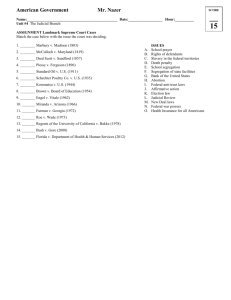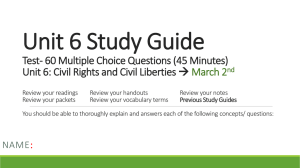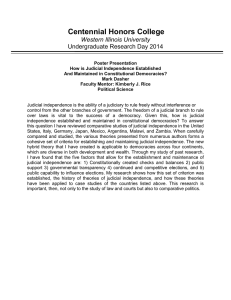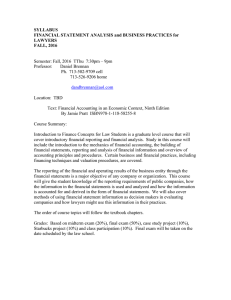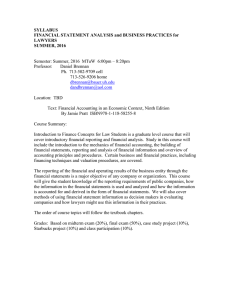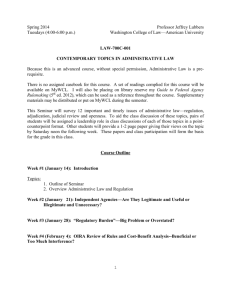The Bench, the Bar, and Everyone Else: Selection
advertisement
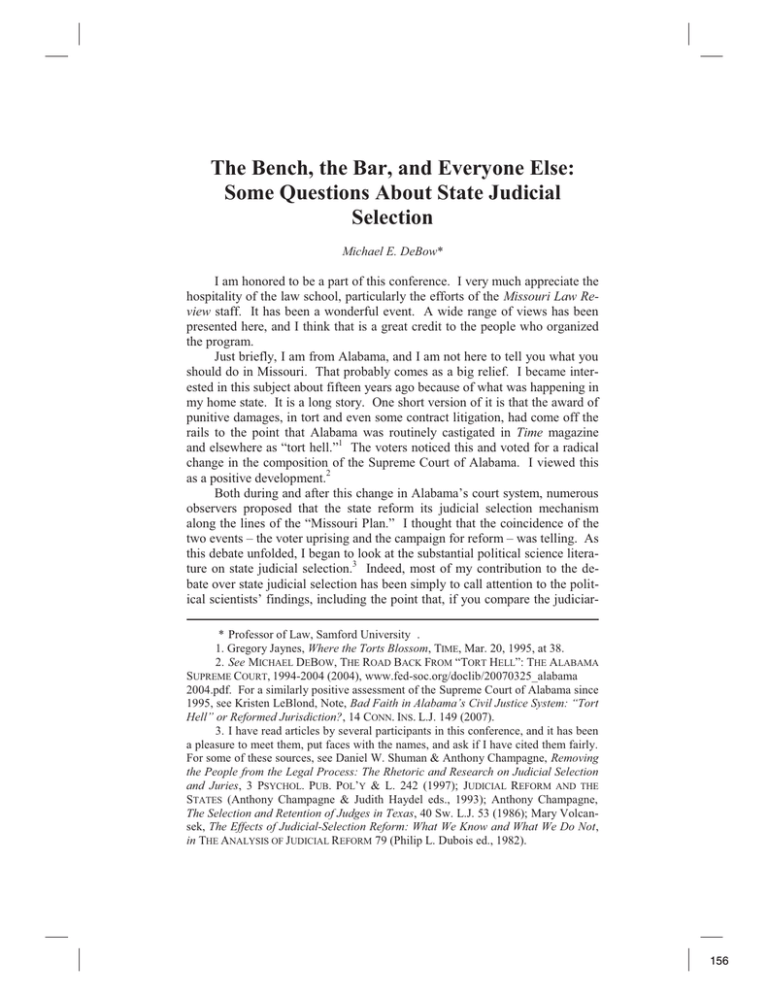
The Bench, the Bar, and Everyone Else: Some Questions About State Judicial Selection Michael E. DeBow* I am honored to be a part of this conference. I very much appreciate the hospitality of the law school, particularly the efforts of the Missouri Law Review staff. It has been a wonderful event. A wide range of views has been presented here, and I think that is a great credit to the people who organized the program. Just briefly, I am from Alabama, and I am not here to tell you what you should do in Missouri. That probably comes as a big relief. I became interested in this subject about fifteen years ago because of what was happening in my home state. It is a long story. One short version of it is that the award of punitive damages, in tort and even some contract litigation, had come off the rails to the point that Alabama was routinely castigated in Time magazine and elsewhere as “tort hell.”1 The voters noticed this and voted for a radical change in the composition of the Supreme Court of Alabama. I viewed this as a positive development.2 Both during and after this change in Alabama’s court system, numerous observers proposed that the state reform its judicial selection mechanism along the lines of the “Missouri Plan.” I thought that the coincidence of the two events – the voter uprising and the campaign for reform – was telling. As this debate unfolded, I began to look at the substantial political science literature on state judicial selection.3 Indeed, most of my contribution to the debate over state judicial selection has been simply to call attention to the political scientists’ findings, including the point that, if you compare the judiciar* Professor of Law, Samford University . 1. Gregory Jaynes, Where the Torts Blossom, TIME, Mar. 20, 1995, at 38. 2. See MICHAEL DEBOW, THE ROAD BACK FROM “TORT HELL”: THE ALABAMA SUPREME COURT, 1994-2004 (2004), www.fed-soc.org/doclib/20070325_alabama 2004.pdf. For a similarly positive assessment of the Supreme Court of Alabama since 1995, see Kristen LeBlond, Note, Bad Faith in Alabama’s Civil Justice System: “Tort Hell” or Reformed Jurisdiction?, 14 CONN. INS. L.J. 149 (2007). 3. I have read articles by several participants in this conference, and it has been a pleasure to meet them, put faces with the names, and ask if I have cited them fairly. For some of these sources, see Daniel W. Shuman & Anthony Champagne, Removing the People from the Legal Process: The Rhetoric and Research on Judicial Selection and Juries, 3 PSYCHOL. PUB. POL’Y & L. 242 (1997); JUDICIAL REFORM AND THE STATES (Anthony Champagne & Judith Haydel eds., 1993); Anthony Champagne, The Selection and Retention of Judges in Texas, 40 Sw. L.J. 53 (1986); Mary Volcansek, The Effects of Judicial-Selection Reform: What We Know and What We Do Not, in THE ANALYSIS OF JUDICIAL REFORM 79 (Philip L. Dubois ed., 1982). 156 778 MISSOURI LAW REVIEW [Vol. 74 ies of elective and Missouri Plan states, you do not find any substantial evidence that one set of states has better or more qualified judges than the other.4 This fact suggests that participants in this debate tend to oversell their positions. I am going to try to avoid doing that. Instead, my primary goal is to raise a couple of questions based on the panelists’ papers. I am going to be brief and take the papers seriatim. Professor Stephen Ware’s taxonomy of selection systems should prove helpful in thinking through the competing alternatives.5 In particular, it would improve the clarity of the debate over judicial selection if his distinction between “hard” (more lawyer-dominated) and “soft” (less so) varieties of the Missouri Plan were to be widely adopted. Indeed, Professor Ware’s paper invites us to think more carefully about the nature of lawyer domination of judicial nominating commissions – specifically, the extent to which lawyers call the shots, either in terms of numbers or because their expertise can generally be expected to allow them to control the agenda and set the tone for the lay members. There are two principal reasons for worrying about an excess of lawyerly influence on the nominating commissions: the ideology and self-interest of lawyers. As to the first, if it is true that lawyers – as a group – tend to gravitate toward an ideological position to the left of the public at large, then a lawyer-dominated commission obviously entails the risk that it will diverge significantly from public attitudes. This point was discussed extensively in the presentations at the symposium and in the papers included in this publication,6 and I do not have anything to add to that discussion.7 4. Michael E. DeBow, State Judicial Selection: Once More Unto the Breach, ENGAGE, Feb. 2008, at 128, www.fed-soc.org/doclib/20080313_Judicial.Selection .Engage9.1.pdf. Earlier I chaired a Federalist Society task force to study judicial elections. The group’s report is reprinted as The Case for Partisan Judicial Elections, 33 U. TOL. L. REV. 393 (2002). More recent political science research generally supportive of a skeptical attitude toward “merit selection” includes James E. Alt & David D. Lassen, Political and Judicial Checks on Corruption: Evidence from American State Governments, 20 ECON. & POL. 33 (2008); CHRIS W. BONNEAU & MELINDA GANN HALL, IN DEFENSE OF JUDICIAL ELECTIONS (2009); Brandice Canes-Wrone & Tom S. Clark, Judicial Independence and Nonpartisan Elections, 2009 WIS. L. REV. 21; Melinda Gann Hall, On the Cataclysm of Judicial Elections and Other Popular Anti-Democratic Myths (Mar. 27-28, 2009) (unpublished manuscript), available at www.law.indiana.edu/front/special/20090327_judicial/doc/hall.pdf; Richard L. Vining, Jr., Amy Steigerwalt & Susan Navarro Smelcer, Bias and the Bar: Evaluating the ABA Ratings of Federal Judicial Nominees (Mar. 26, 2009) (unpublished manuscript), available at http://papers.ssrn.com/sol3/papers.cfm?abstract_id=1368891. 5. Stephen J. Ware, The Missouri Plan in National Perspective, 74 MO. L. REV. 751, 760-64, 755 tbl.1 (2009). 6. Webcasts from the symposium are available at http://law.missouri.edu/ faculty/symposium/symposium09/webcast.html. The papers presented at the symposium are available at http://law.missouri.edu/lawreview/pastissues.html. 2009] BENCH, BAR, AND EVERYONE ELSE 779 The second reason to worry about lawyer domination of nominating commissions is that lawyers as a group have an obvious personal interest in the level of lawyer incomes, which in turn is a function of the importance of law in American society. Over the last seventy years or so, both the number of lawyers and lawyers’ incomes have increased dramatically, as law has become a more important feature of our lives. As noted Stanford legal historian Lawrence Friedman put it in his 1994 book, Total Justice, “There has developed in this country a general expectation of justice, and a general expectation of recompense for injuries and loss.”8 A lot of people consider this a positive development, but others disagree. For example, Philip Howard, a partner at Covington & Burling and author of the recent Life Without Lawyers, argues forcefully that we have far too much law in America today.9 It seems reasonable to think that lawyers, as a group, are more favorably disposed than the general public to the idea that an increase in the amount and importance of law in America is generally a good thing. In short, lawyers are more likely to side with Professor Friedman than with Mr. Howard. Partly this is a function of the ideology of the bar, but self-interest is also at work. Lawyers’ incomes and other aspects of professional lives are directly affected by the amount and importance of law, regulation, and litigation in our society. As a result, it seems reasonable to worry that lawyer self-interest will be reflected in the work of lawyers on nominating commissions. To the extent that lawyers dominate a commission, this may well skew the work of the commission in the direction that best protects and expands the domain of law and lawyers and thus raises lawyers’ incomes and influence.10 What would happen in a Missouri Plan state if the power of lawyers on the nominating commission were reduced significantly? It must be conceded that the lawyer members are in a much better position than the lay members to evaluate judicial candidates’ professional backgrounds, either in practice or on the bench. But just because lawyers have a great deal to contribute does not necessarily mean they should dominate the commissions’ deliberations. 7. The interested reader might wish to consult Russell G. Pearce, The Legal Profession as a Blue State: Reflections on Public Philosophy, Jurisprudence, and Legal Ethics, 75 FORDHAM L. REV. 1339 (2006), and William C. Duncan, “A Lawyer Class”: Views on Marriage and “Sexual Orientation” in the Legal Profession, 15 BYU J. PUB. L. 137 (2001). 8. LAWRENCE M. FRIEDMAN, TOTAL JUSTICE 5 (1994). 9. PHILIP K. HOWARD, LIFE WITHOUT LAWYERS: LIBERATING AMERICANS FROM TOO MUCH LAW (2009). Howard heads the organization Common Good. The interested reader might wish to consult commongood.org. For an earlier attempt to quantify this critique, see Stephen P. Magee, The Optimum Number of Lawyers: A Reply to Epp, 17 L. & SOC. INQUIRY 667 (1992), and works cited therein. 10. One economic study of lawyer support for merit selection found that “the merit plan is associated with between eighteen and thirty-two percent more filings in state supreme courts over the period 1985 through 1994.” F. Andrew Hanssen, On the Politics of Judicial Selection: Lawyers and State Campaigns for the Merit Plan, 110 PUB. CHOICE 79, 80 (2002). 157 780 MISSOURI LAW REVIEW [Vol. 74 Lawyers could serve as non-voting members of the commission, or, less drastically, the number of lawyers on the commission could be reduced so that lay members constitute the majority. If the lay members dominate the commission and the lawyers act (basically) in an advisory capacity, the twin problems of lawyer ideology and lawyer self-interest would be ameliorated. Let us christen the new field of research Professor Ware has identified “selection commission selection” and think further about how to address the issue of lawyer domination of the Missouri Plan’s processes. Professor Brian Fitzpatrick’s paper urges the incorporation of legal realism into the debate over state judicial selection.11 Before reading his paper I had not thought about the issue in exactly this light. For me, Professor Fitzpatrick’s main point is that we are all realists now, except when we talk about judicial selection. This is a very important insight, particularly for those concerned about the “countermajoritarian difficulty” as it arises with regard to state constitutions and litigation under state constitutions.12 Professor Fitzpatrick’s paper falls into the category of “obvious, once someone points it out.” I mean this as very high praise indeed.13 I think this paper has the potential to change the way we think about state judicial selection in a fundamental way, provided that we do care about the potentially countermajoritarian aspects of the work of state supreme courts. The paper by Chief Justice Laura Denvir Stith and Jeremy Root was quite informative as to how the Missouri Plan actually works in Missouri.14 As a defender of judicial elections, I do have to note the irony that the lawyers on the Missouri nominating commission “are popularly elected by their peers.”15 Has anyone ever suggested that the commissioners should be cho11. Brian T. Fitzpatrick, The Politics of Merit Selection, 74 MO. L. REV. 675 (2009). 12. See ALEXANDER BICKEL, THE LEAST DANGEROUS BRANCH (1962). Litigation over same-sex marriage, typically centered on the equal protection provisions of state constitutions, is probably the most visible example of this phenomenon at the present time. Shortly after this conference, the Iowa Supreme Court announced a right to same-sex marriage in Varnum v. Brien, 763 N.W.2d 862 (Iowa 2009). For an influential endorsement of state court enlargement of constitutional rights, see William J. Brennan, Jr., State Constitutions and the Protection of Individual Rights, 90 HARV. L. REV. 489 (1977), and William J. Brennan, Jr., The Bill of Rights and the States: The Revival of State Constitutions as Guardians of Individual Rights, 61 N.Y.U. L. REV. 535 (1986). 13. Here is the spirit in which I say this: On one occasion George Stigler is supposed to have introduced his longtime colleague and friend Milton Friedman by joking that the work that Friedman had done had been so important that, had Friedman never been born, it would not have mattered – someone else surely would have done the work instead. 14. Laura Denvir Stith & Jeremy Root, The Missouri Nonpartisan Court Plan: The Least Political Method of Selecting High Quality Judges, 74 MO. L. REV. 711 (2009). 15. Id. at 715. 2009] BENCH, BAR, AND EVERYONE ELSE 781 sen by a selection commission? It all depends on how far one wishes to push the idea that elections are not the proper way to evaluate candidates for public office, I suppose. In their final paragraph, Justice Stith and Mr. Root argue that the Missouri Plan comes closest to the Aristotelian mean.16 This inspires me to reach for another classical allusion: The debate over state judicial selection is essentially a debate over the age-old question, “Who will guard the guardians?”17 Of course, this is a notoriously difficult question, and appreciating this fact will help us understand why we are most unlikely to reach agreement on this issue. I offer one final thought. Tolstoy famously observed: “All happy families resemble one another; every unhappy family is unhappy in its own way.”18 If no judicial selection mechanism is perfect, then maybe every state is unhappy in its own way. Economists call this “path dependence.”19 If each state is simply on its own unique historical path, this would help explain the difficulty of reforming judicial selection and also the difficulty of making rock-solid, compelling judgments among the competing selection mechanisms. 16. Id. at 750. 17. The expression’s lineage includes Plato’s Republic (particularly 403e) and Juvenal’s Satires (“Sed quis custodiet ipsos custodes?”). See Leonid Hurwicz, Nobel Prize Lecture, But Who Will Guard the Guardians? (Dec. 8, 2007), available at nobelprize.org/nobel_prizes/economics/laureates/2007/hurwicz_lecture.pdf. 18. LEO TOLSTOY, ANNA KARENINA 1 (Louise Shanks Maude & Aylmer Maude trans., Oxford University Press 1998) (1877). 19. See Douglas Puffert, Path Dependence, EH.NET ENCYCLOPEDIA, Feb. 10, 2008, http://eh.net/encyclopedia/article/puffert.path.dependence. 158


